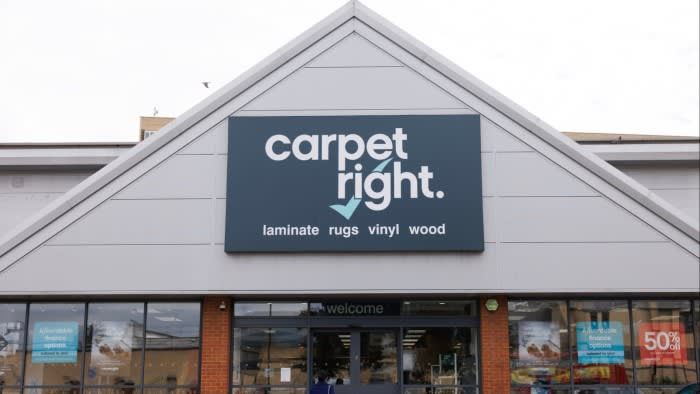Most of Carpetright shops to close with loss of almost 1,600 jobs

Access the Editor's Digest at no cost
Roula Khalaf, the chief editor of the Financial Times, chooses her top stories to highlight in this weekly email.
Most of Carpetright’s shops will shut down, leading to nearly 1,600 employees losing their jobs, even though the founder's family has made an agreement to purchase some sections of the UK carpet and flooring retailer.
PwC officials announced that out of their 273 stores, only 54 were purchased by competitor Tapi, which was created by the son of the founder of Carpetright. It is predicted that the remaining stores will be closing down. As a result of this deal, 308 jobs out of 1,898 total roles will be saved.
Zelf Hussain, a spokesperson from PwC, stated that the company "has been negatively impacted by the difficulties that many retailers, particularly those specializing in expensive products, are currently facing."
Many things led to the downfall of the company, such as a notable decrease in consumer spending caused by high living costs, decreased home sales, and a damaging cyber attack in April that prevented them from conducting business for a period of time.
PwC also mentioned that certain customer requests may not be fulfilled.
Jeevan Karir, who is in charge of running Tapi, mentioned that it was not possible to save the entire business because it was losing a significant amount of money.
Tapi purchased both the intellectual property and brand in a separate agreement, along with two warehouses. The structure of the transaction was influenced by the potential involvement of the UK's competition authority, according to Karir.
The changes will result in some of Carpetright's operations going back to the ownership of founder Lord Philip Harris's family, following a period of rivalry.
The UK store first began in 1988 when Harris opened his initial store in east London. It later went public on the London Stock Exchange in 1993 after growing quickly across the nation. However, in recent years, the company has faced difficulties.
Challenging trading conditions and competition from Tapi have contributed to its struggles.
Harris resigned from his position at Carpetright in 2014, a full five years prior to the chain being acquired by Meditor, led by former fund manager Talal Shakerchi, who was also its lender.
In 2015, Martin Harris, the son of Philip Harris, started Tapi with support from his father and other wealthy individuals like Lord Graham Kirkham, the founder of DFS. They focused on opening stores in areas where Carpetright stores were already operating.
Recent reports have shown that stores that focus on selling things like furniture are also struggling in the current economic climate.
DFS, the biggest seller of sofas and chairs in the UK, reduced its estimated profits by almost half last month. This was due to a decrease in customer interest in buying upholstery, which is now at an all-time low.

























































